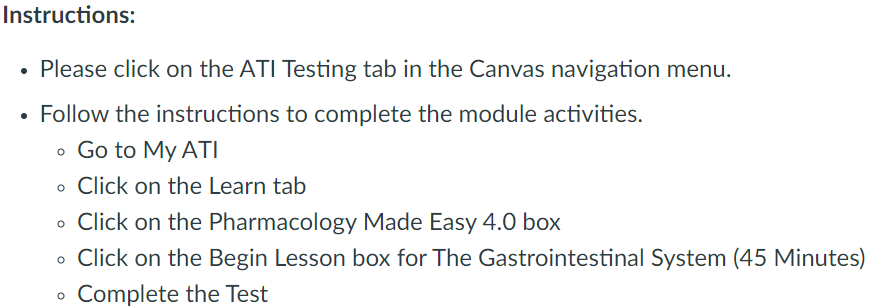NUR105 M6.4: ATI- Pharmacology Made Easy Activity: The Gastrointestinal System
A nurse is planning teaching for a client who has been prescribed loperamide to treat diarrhea. The statement the nurse should include is: “Avoid driving or activities requiring alertness.” Loperamide can cause drowsiness, and clients should avoid activities that require alertness while taking this medication.
A nurse should recognize that misoprostol is contraindicated for a client who has a positive pregnancy test. Misoprostol can cause uterine contractions and is contraindicated in pregnancy.
When caring for a male client with irritable bowel syndrome with diarrhea (IBS-D) who is asking about alosetron, the nurse should inform the client that the drug is prescribed to female clients who have IBS-D lasting more than six months. Aldosterone is indicated for IBS-D in women and is not recommended for men.
A nurse should monitor the client’s phosphorus level when administering aluminum hydroxide. Aluminum-containing antacids can bind to phosphates and decrease their absorption, potentially leading to low phosphorus levels.
When teaching a client with a new prescription for sulfasalazine, the nurse should include the statement: “Use sunscreen and protective clothing while taking sulfasalazine to prevent sunburn.” Sulfasalazine can make the skin more sensitive to sunlight, so clients should take precautions.
Docusate sodium has the therapeutic effect of preventing straining during bowel movements. It softens the stool, making it easier to pass.
Diphenoxylate/atropine should be used with caution for a client with inflammatory bowel disease as it can worsen the condition.NUR105 M6.4: ATI- Pharmacology
When teaching a client with a new prescription for loperamide, the nurse should include the instruction: “Avoid activities that require alertness.” Loperamide can cause drowsiness.NUR105 M6.4: ATI- Pharmacology
A nurse should instruct a client taking ranitidine to wait at least one hour before taking ranitidine and antacids. This helps ensure the effectiveness of ranitidine.
To identify an adverse drug reaction when administering sulfasalazine, the nurse should collect data related to skin integrity, temperature, and CBC (Complete Blood Count). These assessments can help identify possible adverse reactions to the drug.
A nurse should clarify prescriptions for allopurinol and azathioprine because allopurinol delays the conversion of azathioprine and can lead to toxicity due to interactions between these drugs.NUR105 M6.4: ATI- Pharmacology
Dizziness can be recognized as an adverse effect of ondansetron when assessing a client who received it IV.
When providing teaching to a client starting psyllium to treat constipation, the nurse should instruct the client to take the drug with at least 8 oz (237 mL) of fluid and increase fluid and fiber intake for optimal results.
When caring for a client receiving chemotherapy and prescribed ondansetron, the nurse should plan to infuse the drug 30 minutes prior to chemotherapy, infuse the drug slowly over 15 minutes, and repeat the dose four hours after chemotherapy to prevent nausea and vomiting.
A nurse should instruct an older adult client taking cimetidine to report lethargy as a manifestation of potential adverse effects.
Aldosterone therapy is effective when the client reports one formed stool per day.
The nurse should instruct a client taking lubiprostone that it can cause the adverse drug reaction of nausea.
When teaching a client with a new prescription for methotrexate, the nurse should instruct the client to monitor for manifestations of gout, a possible side effect of the drug.
Sulfasalazine is contraindicated for clients with aspirin sensitivity.
A nurse should recognize that ketoconazole interacts with ranitidine.
When teaching a client with a new prescription for dimenhydrinate, the nurse should include the instructions to take the drug 30 to 60 minutes before activities that trigger nausea, avoid activities that require alertness, and increase fluid and fiber intake.
Aldosterone has protocols that require clients to meet specific risk management criteria and sign a treatment agreement before the nurse can administer the drug. This is due to its potential serious adverse effects, and close monitoring and restrictions are necessary.
If you’re a nursing student gearing up for your ATI testing or NUR105 M6.4: ATI- Pharmacology questions, the NCLEX exam and you’re seeking assistance or support to excel in your endeavours, I encourage you to consider our service at fixmygpa.com. We specialize in providing expert guidance, tutoring, and assistance to help you achieve the success you deserve. Whether it’s navigating pharmacology, mastering gastrointestinal system concepts, or any other challenging aspect of your nursing education, we’re here to support you. Don’t hesitate to reach out and let us help you reach your academic and professional goals. Your success is just a click away!



